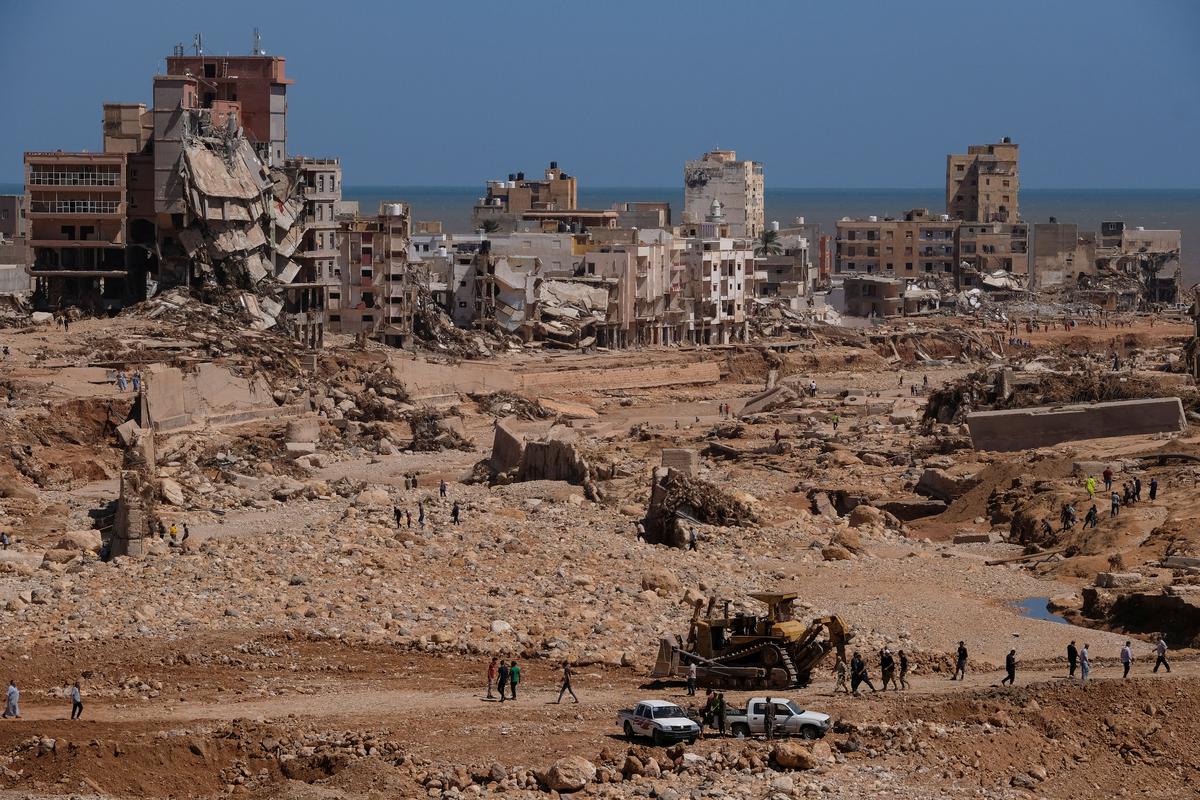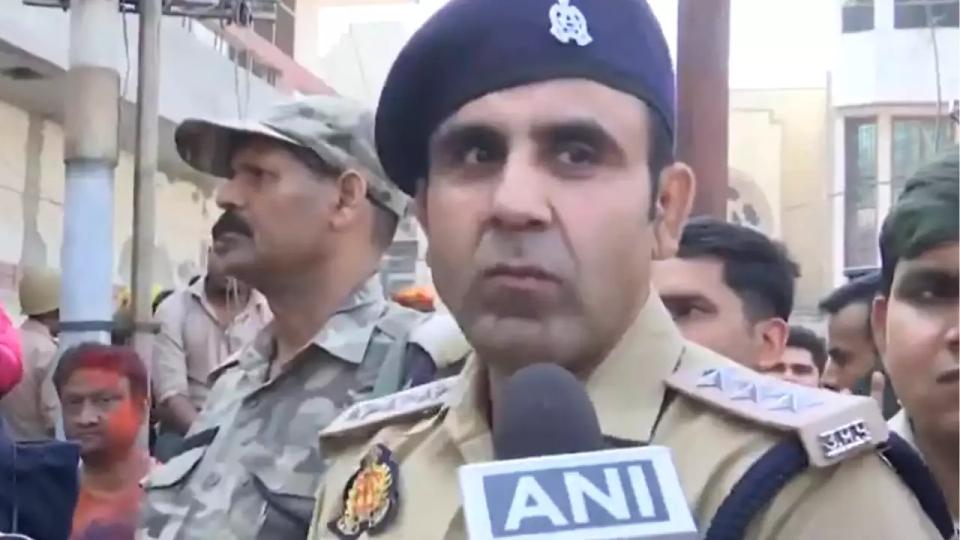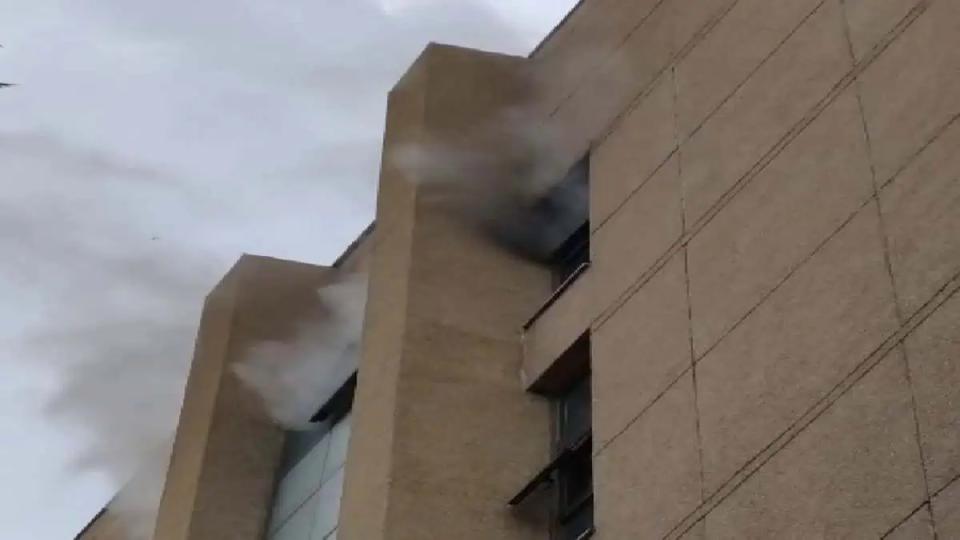Death toll from a tsunami-sized flash flood could be more than 20,000 in Libya
Fri 15 Sep 2023, 13:25:12

Jeddah: An unprecedented aid operation was underway in eastern Libya on Thursday amid fears that the final death toll from a tsunami-sized flash flood could be more than 20,000.
The enormous surge of storm water burst two upstream dams late on Sunday and reduced the city of Derna to an apocalyptic wasteland where entire city blocks and untold numbers of people were washed into the Mediterranean.
“Within seconds the water level suddenly rose,” said one injured survivor who was swept away with his mother before they managed to cling on to an empty building downstream. “The water was rising with us until we got to the fourth floor, the water was up to the second floor.”
Aid has been sent or promised by regional states including Saudi Arabia, Algeria, Egypt, Jordan, Kuwait, Qatar, Tunisia, Turkiye and the UAE.
The US has also pledged to help, and in Europe the aid effort has been joined by Britain, Finland, France, Germany, Italy and Romania.
Derna Mayor Abdulmenam Al-Ghaithi said deaths in the city could reach 20,000, based on the extent of the damage.
The death toll in Derna is now at 11,300 as search efforts continue following a massive flood fed by the breaching of two dams in heavy rains.
Marie El-Drese, secretary-general of Libyan Red Crescent, said that a further 10,100 are reported missing.
The World Meteorological Organization said the huge death toll could have been avoided if Libya, a failed state for more than a decade, had a functioning weather agency.
“They could have issued warnings,” Secretary-General Petteri Taalashe said. “The emergency management authorities would have been able to carry out evacuation of the people. And we could have avoided most of the human casualties.”
The WMO said earlier this week that the National Meteorological Center had issued warnings 72 hours before the flooding, notifying all governmental authorities by email and through media.
Daniel, an unusually strong Mediterranean storm, caused deadly flooding in towns across eastern Libya, but the worst-hit was Derna. As the storm pounded the coast Sunday night, residents said they heard loud explosions when two dams outside the city collapsed.
Floodwaters gushed down Wadi Derna, a valley that cuts through the city, crashing through buildings and washing people out to sea.
Mohamed Al-Menfi, head of the three-member council that is Libya’s internationally recognized government, said anyone whose failure to
act was responsible for the failure of the dam should be held accountable.
act was responsible for the failure of the dam should be held accountable.
Officials in eastern Libya warned the public about the coming storm and on Saturday had ordered residents to evacuate areas along the coast, fearing a surge from the sea. But there was no warning about the dams collapsing.
The startling devastation reflected the storm’s intensity, but also Libya’s vulnerability. Oil-rich Libya has been divided between rival governments for most of the past decade — one in the east, the other in the capital, Tripoli — and one result has been widespread neglect of infrastructure.
The two dams that collapsed outside Derna were built in the 1970s. A report by a state-run audit agency in 2021 said the dams had not been maintained despite the allocation of more than 2 million euros for that purpose in 2012 and 2013.
Libya’s Tripoli-based Prime Minister Abdul-Hamid Dbeibah acknowledged the maintenance issues in a Cabinet meeting Thursday and called on the Public Prosecutor to open an urgent investigation into the dams’ collapse.
The disaster brought a rare moment of unity, as government agencies across the country rushed to help the affected areas.
While the Tobruk-based government of east Libya is leading relief efforts, the Tripoli-based western government allocated the equivalent of $412 million for reconstruction in Derna and other eastern towns, and an armed group in Tripoli sent a convoy with humanitarian aid.
Derna has begun burying its dead, mostly in mass graves, said eastern Libya’s health minister, Othman Abduljaleel earlier Thursday.
More than 3,000 bodies were buried by Thursday morning, the minister said, while another 2,000 were still being processed, He said most of the dead were buried in mass graves outside Derna, while others were transferred to nearby towns and cities.
Abduljaleel said rescue teams were still searching wrecked buildings in the city center, and divers were combing the sea off Derna.
Untold numbers could be buried under drifts of mud and debris, including overturned cars and chunks of concrete, that rise up to four meters (13 feet) high. Rescuers have struggled to bring in heavy equipment as the floods washed out or blocked roads leading to the area.
Libya’s eastern based parliament, The House of Representatives, approved Thursday an emergency budget of 10 billion Libyan dinars — roughly $2 billion — to address the flooding and help those affected.
No Comments For This Post, Be first to write a Comment.
Most viewed from International
Most viewed from World
AIMIM News
Latest Urdu News
Most Viewed
May 26, 2020
Do you think Canada-India relations will improve under New PM Mark Carney?
Latest Videos View All
Like Us
Home
About Us
Advertise With Us
All Polls
Epaper Archives
Privacy Policy
Contact Us
Download Etemaad App
© 2025 Etemaad Daily News, All Rights Reserved.

.jpg)






.jpg)
.jpg)


.jpg)
.jpg)
.jpg)
.jpg)
.jpg)
.jpg)
























